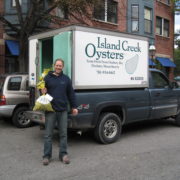Participatory Journalism
By: Patrick Maguire
Book Chapter: Family-Life Experiences
Posted: 01/24/2010
The life and intriguing career of the late George Plimpton (1927-2003), have fascinated me from a very young age. I admire his writing, and there is something very endearing and romantic about his “participatory journalism.” If you’ve never heard of Mr. Plimpton, his varied life included experiences as an “amateur professional,” where he participated in roles with professional athletes, and then wrote about them. His adventurous stints included boxing, baseball, hockey, tennis and football. One of his most popular books, Paper Lion chronicled his experience as a quarterback with the Detroit Lions in 1963, which included running five plays in an intra-squad scrimmage. I share Plimpton’s curiosity about people and envy the roles that he’s played. As noted in his obituary in The New York Times, “Mr. Plimpton believed that it was not enough for writers of nonfiction to simply observe; they needed to immerse themselves in whatever they were covering to understand fully what was involved.”
Last week I received a link to an article from my friend, Adam Pires, a carpenter who was also a fine-dining waiter for several years. The article that appeared in The Globe and Mail, was written by Alexandra Gill, a Vancouver restaurant critic. Ms. Gill, who is notorious for being tough on servers, agreed to work as a server for a week, and as the sub-title for the article states, It’s a lot easier to dish it out than to take it.
As readers of this blog know, I’ve always maintained that people with customer service industry experience have greater empathy and appreciation for all service industry workers that they interact with. Many readers have concurred that a mandatory service industry stint as a prerequisite to graduating high school, might not be a bad idea.
I commend Alexandra Gill for walking a mile in a server’s shoes. She agreed to spend a week training with Patrick Malpass, a waiter who she was particularly hard on in a favorable review of Cioppino’s Mediterranean Grill in Vancouver. Alexandra writes, “I actually called him ‘The Dictator’ and wrote that there was a point during the meal when I felt the urge to punch him. Ouch.”
After Alexandra’s week shadowing, training, then taking some tables on her own, she shared her lessons learned; “…my week as a fine-dining waitress taught me two important lessons. First, this job is no cakewalk; it’s one of the most backbreaking, mind-rattling, stressful careers out there. Those, like Patrick, who go the extra mile, have earned my utmost respect. Perhaps more importantly, at least from a critic’s perspective, I also learned that poor service can’t always be blamed solely on the waiter. For better or worse, it takes a whole restaurant to please a customer, and the people behind the scenes can either make or break a dinner.”
On Friday, two days after the article appeared, Alexandra Gill and Patrick Malpass, the head waiter at Cioppino’s for more than 10 years, participated in a live, on-line chat. I asked each of them to complete the following sentence:
Based on your serving experience, serving would be a lot easier if customers _________.
Patrick Malpass: Loaded question…I guess serving would be a lot easier if customers would have a little confidence in the fact that the majority of us really know how to do our jobs, so just let us do them, you might just be pleased with the results.
Alexandra: Serving would be a lot easier if customers… were honest. Some are too intimidated to say what they really want. Others are trying too hard to show off. Be humble. Be truthful. We can’t help you if you can’t help yourself.
There’s a great scene in the movie Good Will Hunting, between psychologist Sean Maguire (Robin Williams) and 20 year-old genius and MIT janitor Will Hunting (Matt Damon) sitting in the Public Garden in Boston looking out at the Swan Boats. In an earlier scene Will mocked Sean’s art work and disrespected Sean’s wife.
Will: So what’s this? A Taster’s Choice moment between guys? This is really nice. You got a thing for swans? Is this like a fetish? It’s something, like, maybe we need to devote some time to?
Sean: I thought about what you said to me the other day, about my painting.
Will: eah?
Sean: Stayed up half the night thinking about it. Something occurred to me, I fell into a deep peaceful sleep, and I haven’t thought about you since. You know what occurred to me?
Will: No.
Sean: You’re just a kid. You don’t have the faintest idea what you’re talking about.
Will: Why thank you.
Sean: It’s all right. You’ve never been out of Boston.
Will: Nope.
Sean: So, if I asked you about art, you’d probably give me the skinny on every art book ever written. Michelangelo. You know a lot about him. Life’s work, political aspirations, him and the pope, sexual orientation, the whole works, right? But I bet you can’t tell me what it smells like in the Sistine Chapel. You’ve never actually stood there and looked up at that beautiful ceiling. Seen that….If I ask you about women, you’d probably give me a syllabus of your personal favorites. You may have even been laid a few times. But you can’t tell me what it feels like to wake up next to a woman and feel truly happy. You’re a tough kid. I ask you about war, you’d probably uh…throw Shakespeare at me, right? “Once more into the breach, dear friends.” But you’ve never been near one. You’ve never held your best friend’s head in your lap, and watched him gasp his last breath looking to you for help. I ask you about love, y’probably quote me a sonnet. But you’ve never looked at a woman and been totally vulnerable…known someone that could level you with her eyes. Feeling like God put an angel on Earth just for you..who could rescue you from the depths of Hell. And you wouldn’t know what it’s like to be her angel, and to have that love for her be there forever. Through anything. Through cancer. And you wouldn’t know about sleepin’ sittin’ up in a hospital room for two months, holding her hand because the doctors could see in your eyes that the terms visiting hours don’t apply to you. You don’t know about real loss, because that only occurs when you love something more than you love yourself. I doubt you’ve ever dared to love anybody that much. I look at you: I don’t see an intelligent, confident man. I see a cocky, scared shitless kid. But you’re a genius, Will. No one denies that. no one could possibly understand the depths of you. But you presume to know everything about me because you saw a painting of mine and ripped my fuckin’ life apart. You’re an orphan, right? Do you think I’d know the first thing about how hard your life has been, how you feel, who you are because I read Oliver Twist?
Interestingly, George Plimpton had a small role in Good Will Hunting, playing a psychologist.
One Response to “Participatory Journalism”
Leave a Reply
Permalink | Posted in Family-Life Experiences | 1 Comment »



That scene from “Good Will Hunting” probably won Robin Willams his Oscar. How did those kids write that scene? Really incredible writing and acting. Oh yes, and it is quite on topic.
Another interesting article.